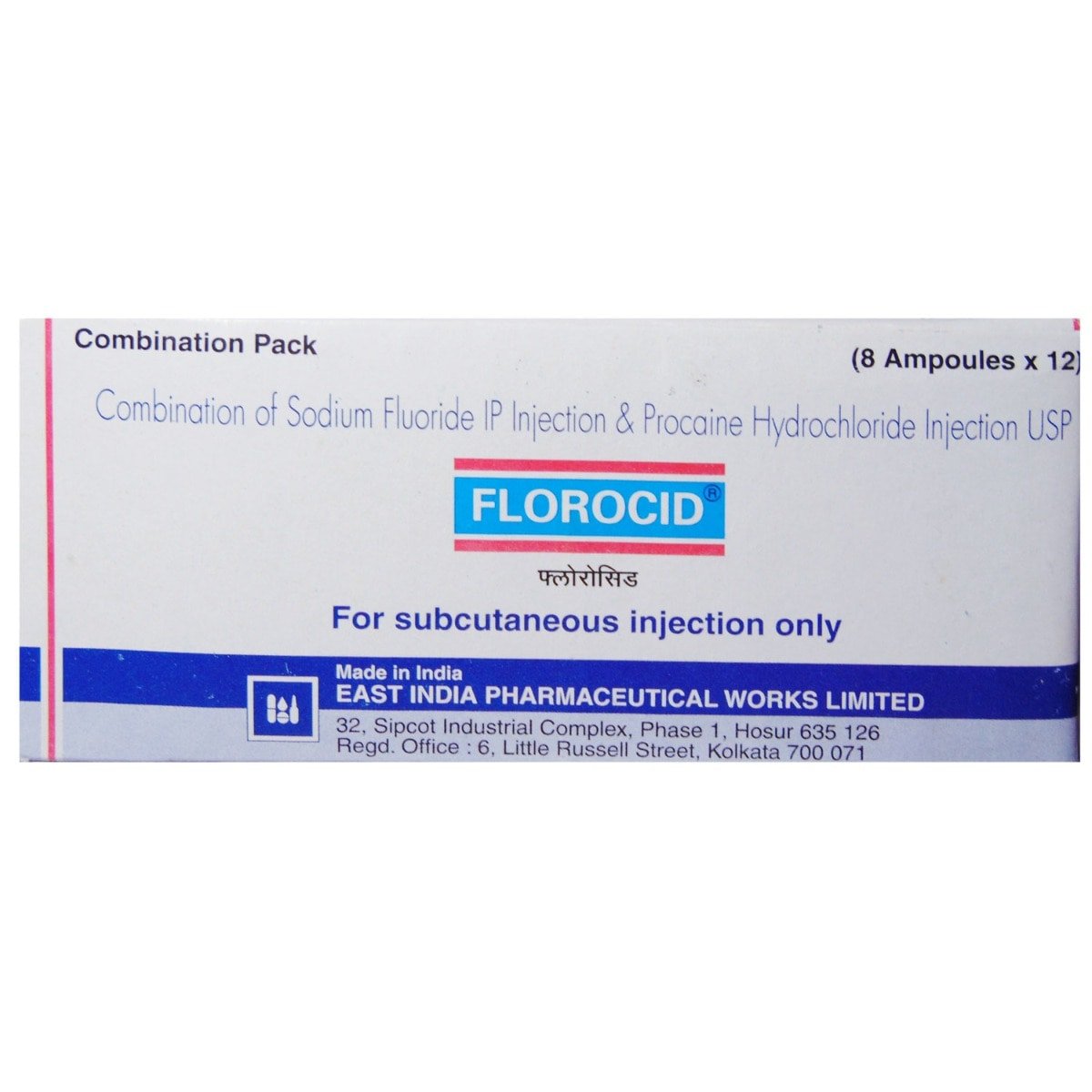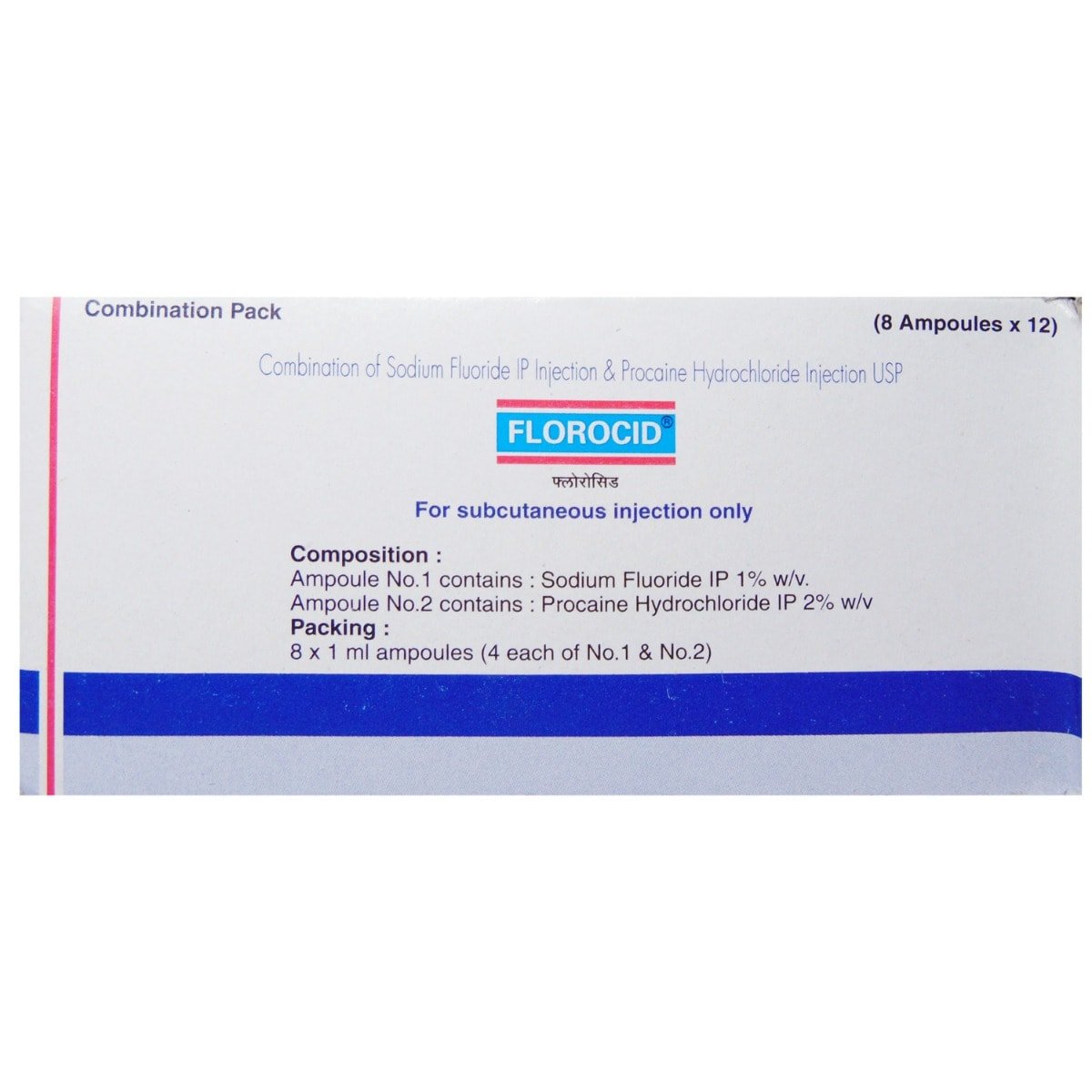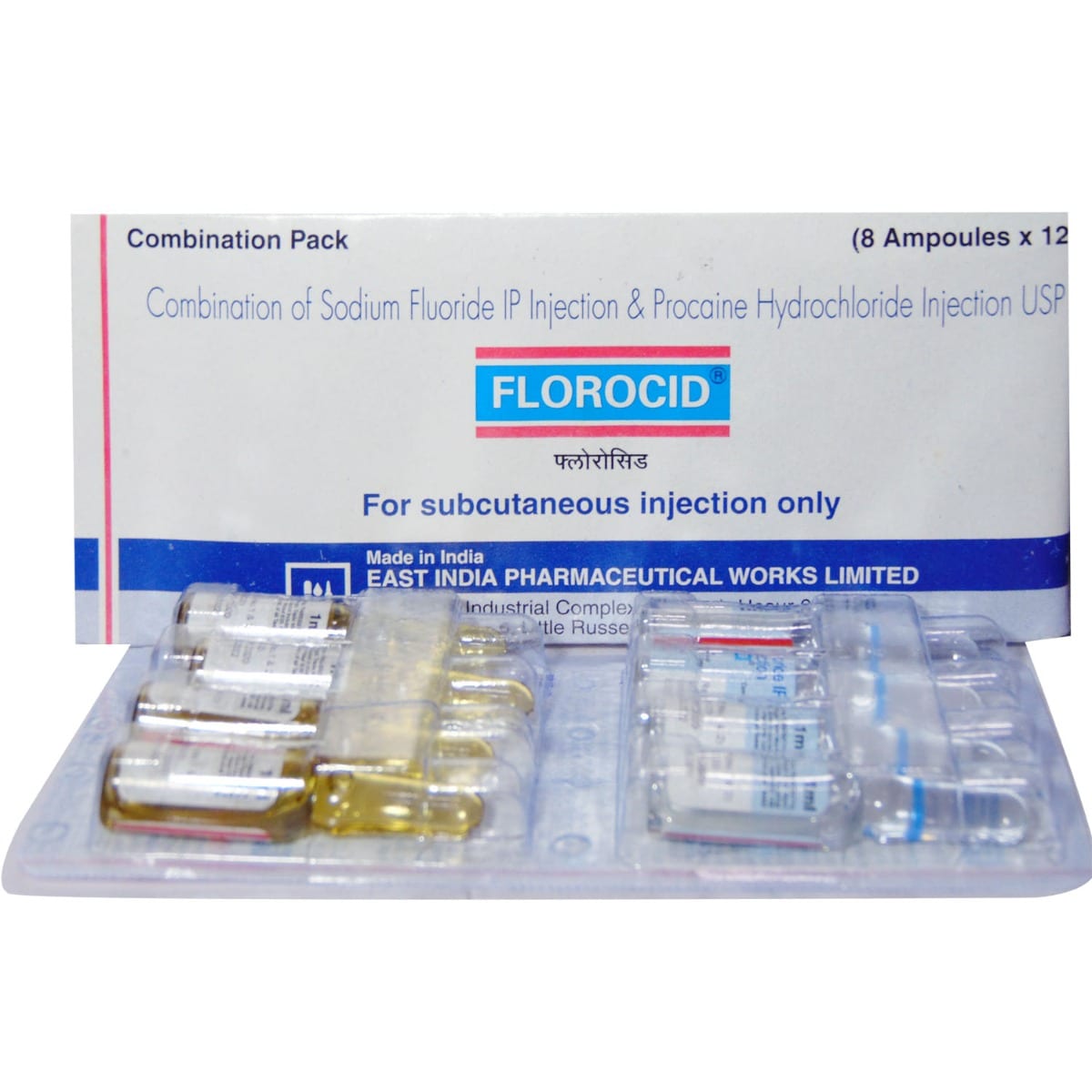Florocid Injection 8 x 1 ml
MRP ₹155
(Inclusive of all Taxes)
₹23.3 Cashback (15%)
Provide Delivery Location
Online payment accepted
 Prescription drug
Prescription drugWhats That
Composition :
Manufacturer/Marketer :
Consume Type :
Expires on or after :
Return Policy :
About Florocid Injection 8 x 1 ml
Florocid Injection 8 x 1 ml belongs to a group of medicines called 'anti-parasitic drugs/ anti-anthelmintics/ anti tapeworm drugs', primarily indicated for the treatment of certain parasitic infections including Bancroft's filariasis, Eosinophilic lung, Loiasis, and River blindness. Parasites are the living organisms that live inside another organism (the host) for their survival (e.g. by getting nutrients from the host's body. These parasites grow, reproduce, get important nutrients from a person's body and make them sick called 'parasitic infection. Common parasitic infections are River blindness, Loiasis, Eosinophilic lung, and Bancroft's filariasis.
Florocid Injection 8 x 1 ml consists of two medicines namely: 'Sodium Fluoride' and 'Procaine' that helps to treat certain parasitic infections and symptoms associated with it. Sodium Fluoride is an anti-parasitic drug that works by killing the worm that causes filariasis. While Procaine comes into the category of medicines known as 'local anesthesia', which works by causing a feeling of numbness in the skin and mucous membranes.
Take Florocid Injection 8 x 1 ml as suggested by the doctor. You are advised to take Florocid Injection 8 x 1 ml as long as suggested by your doctor. Some persons may experience pain at the injection site, tingling sensation, feeling of numbness. Contact your health care provider if these side effects bother you or do not go within a couple of days.
Significantly, you need to visit your doctor regularly that will help the doctor check that the infection is clearing up. Likewise, the doctor may also suggest having an eye check-up. Florocid Injection 8 x 1 ml may cause dizziness, affects thinking ability, and changes vision so make sure that you did not drive or do any work that needs a clear vision if any of the unpleasant effects of medicine become bothersome then call your doctor on an urgent basis. Florocid Injection 8 x 1 ml is allowed to use in pregnancy as it a category B drug that is not supposed to harm an unborn baby. This medicine can only be used in breastfeeding when strictly advised by the doctor as it has the ability to pass into breast milk.
Uses of Florocid Injection 8 x 1 ml
Directions for Use
Key Benefits
Florocid Injection 8 x 1 ml consists of two medicines namely: 'Sodium Fluoride' and 'Procaine' that helps to treat certain parasitic infections and symptoms associated with it. Sodium Fluoride is an anti-parasitic drug that works by killing the worm that causes filariasis. While Procaine comes into the category of medicines known as 'local anesthesia', which works by causing a feeling of numbness in the skin and mucous membranes.
Storage
Drug Warnings
One should consult with their doctor before giving Florocid Injection 8 x 1 ml to the child as it may cause a serious reaction if used in very young children. The use of Florocid Injection 8 x 1 ml is not allowed in patients dealing with a blockage in your stomach or intestine, difficulty in urinating, enlarged prostate, an asthma attack. Florocid Injection 8 x 1 ml may cause night blindness or even loss of vision if used for a long time, so one should visit their doctor regularly and should avoid driving or doing any work that needs a clear vision. The doctor may recommend a corticosteroid medication in certain patients facing river blindness with severe symptoms. It is given to reduce the inflammation that happened during the death of worms. Take these medications exactly in the same manner as directed by your doctor.
Diet & Lifestyle Advise
- It is best to consume a balanced diet, which is high in nutrients and very less in refined sugars/ processed foods.
- Fiber is important for the bowel movement which helps to cleanse parasites from the body so include more fiber-rich foods in the body like oats.
- Pumpkin seeds, garlic, honey, and papaya seeds are considered antiparasitic foods so it is best to include them in your diet.
- Sometimes doctors may recommend a grain-free, sugar-free diet while others may recommend limiting fruit intake in order to further reduce dietary sugars, so better talk to your nutritionist.
Side Effects of Florocid Injection 8 x 1 ml
- Numbness
- Tingling
- Minor pain at or around the injection site
Habit Forming
Therapeutic Class
All Substitutes & Brand Comparisons
FAQs
Drug-Drug Interactions Checker List
- PROCAINAMIDE
- PANCURONIUM
- ATRACURIUM
- SUCCINYLCHOLINE
- SULFAMETHOXAZOLE
Special Advise
Certain diagnostic tests like a Blood smear could help in detecting the type of parasite infection.
Disease/Condition Glossary
Bancroft's filariasis: It is caused by thread-like worms that live inside the lymphatic system of humans. The lymphatic system of the body consists of fluid and is responsible for fighting infections. This disease spreads from one person to person by mosquitoes. Common symptoms include fever, skin exfoliation. And high levels of eosinophils (white blood cells).
Loiasis: It is also called as 'African eye worm' which is an infectious parasitic disease that is transmitted to humans by the bite of Chrysops deerfly species. A person dealing with this disease may face itchy, non-painful swellings in their body. Sometimes, a person may see worms crawling under their skin or an eye worm.
River blindness: It is caused by a parasitic worm and is transmitted through repeated bites by black flies that live near the rivers and streams. If not treated, then it may even cause visual impairment and sometimes blindness.
Eosinophilic lung: This is a disease related to lung problems in which white blood cells in the body get increased. White blood cells are responsible for fighting allergic reactions and certain infections. Some of the symptoms of this disease include cough, chest pain, and tightness, increased mucus, rapid breathing, bloody mucus, and shortness of breath.

Have a query?
Alcohol
Safe if prescribed
If a person is already taking Florocid Injection 8 x 1 ml, then they should limit the consumption of alcohol as it may increase the side effects of the medicine.
Pregnancy
Consult your doctor
Florocid Injection 8 x 1 ml is a category B drug that does not cause any harm to the unborn baby but this medicine can only be used in pregnancy if strongly suggested by the doctor.
Breast Feeding
Consult your doctor
Florocid Injection 8 x 1 ml has the ability to pass into breast milk that can harm the unborn baby, so do not use this medicine without asking the doctor.
Driving
Safe if prescribed
Florocid Injection 8 x 1 ml may cause blurred vision so one should avoid driving as it may increase the chances of accidents.
Liver
Consult your doctor
Persons dealing with liver disease may be are at higher risk of getting side effects of Florocid Injection 8 x 1 ml. Treatment with Florocid Injection 8 x 1 ml should be administered cautiously in these patients. Initially, the doctor may suggest a lower dosage.
Kidney
Consult your doctor
Persons dealing with kidney disease may be are at higher risk of getting side effects of Florocid Injection 8 x 1 ml. Treatment with Florocid Injection 8 x 1 ml should be administered cautiously in these patients. Initially, the doctor may suggest lower dosages.
Children
Safe if prescribed
Florocid Injection 8 x 1 ml can only be used in children if strongly suggested by the doctor as misuse of medication may cause serious side effects in children.









